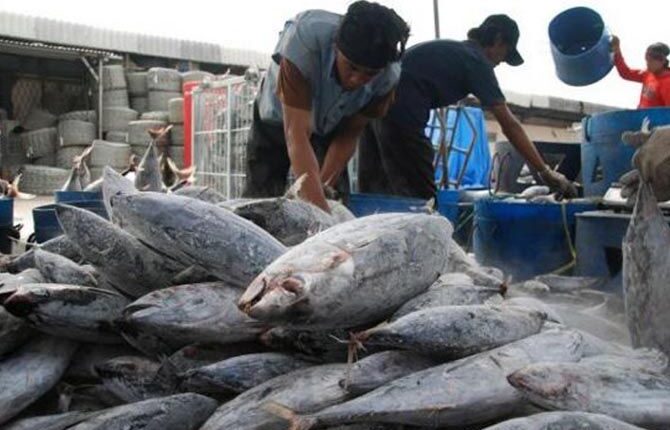Fishery Sector Job Creation Law Promotes Blue Economy Development
By: Alfisyah Dianasari )*
The Job Creation Act is the Government’s breakthrough to simplify regulations. The regulation is expected to increase licensing for investors, including in the fisheries sector for the realization of a blue economy (Blue Economy).
Indonesia has maritime wealth to be proud of. Moreover, Indonesia is the second largest producing country in the world after China. The Indonesian sea itself is the largest part of the coral reef triangle, which is the habitat of 76% of all coral reef species and 37 percent of all world coral reef fish species. This shows that the Blue Economy in Indonesia can develop rapidly.
According to the World Bank, the blue economy is an environmentally sound use of marine resources to support economic growth, prosperity and livelihoods as well as the preservation of marine ecosystems.
There are various sectors included in it, such as fisheries, renewable energy, tourism, water transportation, waste management and climate change mitigation. If it is managed with a sustainable concept, each sector will be able to support in realizing a prosperous Indonesia. Moreover, the fisheries sector experienced growth from year to year by 4.55 percent in the third quarter of 2021, this figure is apparently higher than the previous year.
Efforts to optimize the marine and fisheries sector should continue to heed the blue economy principle, in which the balance between the use of marine resources for economic activities and the health of the marine and coastal environment is maintained. This is also related to the implementation of the implementing regulations of Law Number 11 of 2020 concerning Job Creation in the marine and fisheries scope.
This was said by the Minister of Maritime Affairs and Fisheries, Sakti Wahyu Trenggono on the occasion of the 2021 legal forum with the theme “Implementation of the Implementing Regulations of Law Number 11 of 2020 concerning Job Creation in encouraging an increase in Non-Tax State revenues for the Marine and Fisheries Sector.
The implementation of the Blue Economy in the implementation of Law No. 11 of 2020 concerning Job Creation is important to implement in marine and fisheries development, because it requires a number of main principles which include social openness, economic growth, welfare and environmental sustainability. KKP has also implemented a blue economy in every program implemented through single ocean management.
Trenggono also explained that his party had and was finalizing the implementing regulations of the Job Creation Act and its derivatives, which are expected to encourage an increase in Non-Tax State revenues in the marine and fisheries sector as supporting national development, which will be managed and utilized to improve services to the community.
Meanwhile, South Sulawesi has officially stipulated Regional Regulation (Perda) Number 3 of 2022 concerning the Regional Spatial Plan for the Province of South Sulawesi 2022-2041 on April 22, 2022.
The Director General of Marine Spatial Management (PRL), Victor Gustaaf Manoppo explained, the regional regulation was the first legal product resulting from the integration of the final document of the Zoning Plan for Coastal Zone and Small Islands (RZWP-3-K) into the Provincial Spatial Plan in accordance with Government Regulations. (PP) Number 21 of 2021 concerning the Implementation of Spatial Planning, a derivative rule from Law Number 11 of 2020 concerning Job Creation.
The preparation of these technical materials is also in accordance with the Regulation of the Minister of Maritime Affairs and Fisheries Number 28 of 2021 concerning the implementation of Marine Spatial Planning. Meanwhile, 10 other provinces stated that there was no change in the technical material of coastal waters, so that the integration process with the Provincial Spatial Planning (RTRW) could be carried out. These provinces include Aceh, Riau, Riau Islands, Jambi, Bangka Belitung Islands, Bali, West Kalimantan, Central Kalimantan, East Kalimantan and West Papua.
Referring to Perda 21/2021, the technical material for coastal waters in the provincial spatial layout plan is in the form of a final RZWP-3-K document consisting of plans for objectives, policies and strategies for provincial marine spatial planning, marine spatial structures, and marine biota migration routes, etc. .
The Ministry of Maritime Affairs and Fisheries also explained that the legal product was in line with the policy of the Minister of Maritime Affairs and Fisheries related to sustainable marine spatial planning. This is considered to be a fundamental instrument to encourage development in coastal and marine areas through the development of a blue economy.
Of course, Indonesia’s marine wealth must continue to be developed, of course, in its efforts, a synchronous regulation is needed between regional regulations and regulations at the center.
)* The author is a contributor to the Press Circle and Cikini Students
